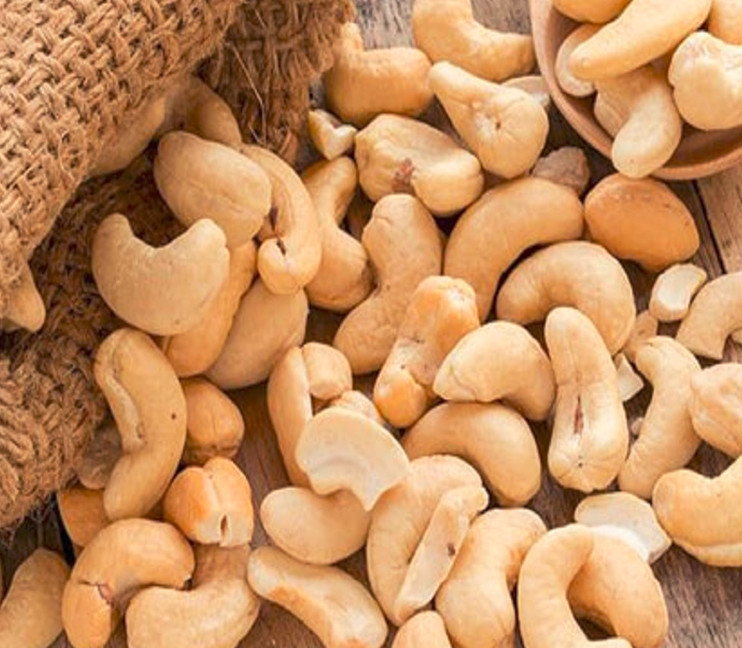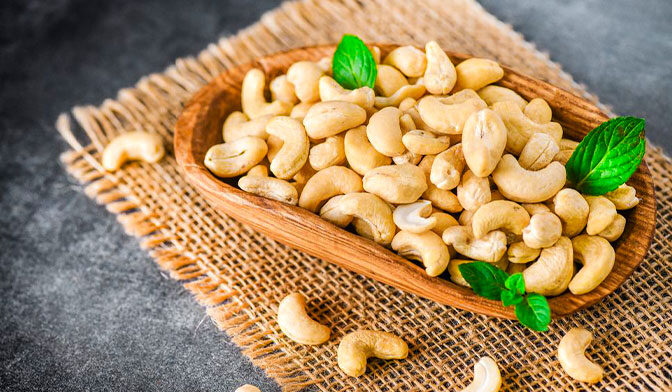Cashews are an excellent source of iron, which is essential for the formation of hemoglobin, which transports oxygen from the lungs to all parts of the body through red blood cells.
A high percentage of copper is found in cashews, which is essential for many physiological processes, including the use of iron, getting rid of free radicals, and developing bones and connective tissue.
Cashews contain unsaturated fats, which reduce bad cholesterol and triglycerides in the blood, reducing the risk of cardiovascular disease, strokes, and heart attacks.

Cashews’ benefits according to their effectiveness
Reducing symptoms associated with metabolic syndrome: a disease that increases the risk of heart disease, diabetes, and strokes. In a study published in 2007 in the European Journal of Nutrition of a group of people with this syndrome, walnuts and cashews increased the antioxidant capacity of healthy diets.
According to a study published in 2019 in the American Journal of Clinical Nutrition, eating one and a half servings of cashews did not significantly change blood pressure, lipid levels, or blood sugar levels.
A systematic review published in Nutrients in 2017 found that eating nuts, including cashews, stimulated weight gain because they are high in calories. On the contrary, it stimulates eating. Appetite, satiety, and metabolism can be controlled with them.
Pregnancy-friendly properties of cashews
The International Journal of Developmental Neuroscience published a study in 2017 finding that cashews can accelerate early reflex development and improve memory in fetuses.
Generally, nuts during pregnancy reduce the risk of asthma in children. According to a preliminary study published in the Journal of Allergy and Clinical Immunology in 2012, mothers should consume peanuts or other nuts at least once a week to prevent allergic reactions. While cashews are safe when consumed in moderate amounts in foods for pregnant and lactating women, there is no information regarding their safety if consumed in large amounts. During this period, it is recommended to consume it in normal and moderate amounts.
Cashews’ nutritional value
Raw, unsalted, dry-roasted, and oil-roasted cashews contain the following nutrients:
| Nutritional element | Raw cashews | Dry roasted cashews | Cashews roasted in oil |
| calorie (calorie) | 553 | 574 | 580 |
| water (ml) | 5.2 | 1.7 | 3.48 |
| protein (grams) | 18.22 | 15.31 | 16.84 |
| fat (grams) | 43.85 | 46.35 | 47.77 |
| carbohydrates (grams) | 30.19 | 32.69 | 29.87 |
| fiber (grams) | 3.3 | 3 | 3.3 |
| Sugars (grams) | 5.91 | 5.01 | 5.01 |
| Phosphorus (mg) | 593 | 490 | 531 |
| potassium (mg) | 660 | 565 | 632 |
| Magnesium (mg) | 292 | 260 | 273 |
| Calcium (mg) | 37 | 45 | 43 |
| iron (mg) | 6.68 | 6 | 6.05 |
| copper (mg) | 2.195 | 2.22 | 2.043 |
| Sodium (mg) | 12 | 16 | 13 |
| Selenium (micrograms) | 19.9 | 11.7 | 20.3 |
| zinc (mg) | 5.78 | 5.6 | 5.35 |
| Vitamin B1 (mg) | 0.423 | 0.2 | 0.363 |
| Vitamin B2 (mg) | 0.058 | 0.2 | 0.218 |
| Vitamin B3 (mg) | 1.062 | 1.4 | 1.736 |
| Vitamin B5 (mg) | 0.864 | 1.217 | 0.88 |
| Vitamin B6 (mg) | 0.417 | 0.256 | 0.323 |
| Vitamin K (micrograms) | 34.1 | 34.7 | 34.7 |
| Vitamin E (mg) | 0.9 | 0.92 | 0.92 |
| Saturated fat (grams) | 7.783 | 9.157 | 8.478 |
| monounsaturated fat (g) | 23.797 | 27,317 | 25923 |
| Polyunsaturated fat (grams) | 7.845 | 7.836 | 8.546 |
Cashews have side effects
When used in food, cashews are generally considered safe; however, there is not enough information about their safety when taken as medicine in large doses. Unroasted cashews can cause skin irritation, redness, and blisters.

Contraindications to cashews
Certain groups of people are cautioned against using cashews, and the following points clarify these restrictions:
Due to the lack of information on its safety when consumed in high medicinal doses, it is recommended that cashews be consumed in moderate amounts during pregnancy and breast-feeding.
Consuming large amounts of cashews may increase blood sugar levels, so diabetics should monitor their blood sugar levels while eating cashews and may need to adjust their diabetes medications.
It is recommended that you avoid eating large amounts of cashews at least two weeks before a planned surgery because cashews can affect blood sugar levels. Don’t eat too many cashews.
As compared to other nuts, cashews contain moderate amounts of oxalate, but consuming large amounts of them daily can lead to a higher than average oxalate intake.
The cashew fruit can reduce lipid levels and insulin resistance. In 2015, a study in the Journal of Nutritional Sciences found that cashew fruit extract reduced weight gain and fat storage in mice fed a high-fat diet.
Research published in the Journal of Drug Development Research in 2015 found that cashew gum may reduce the risk of gastrointestinal damage in mice.
Raw and roasted nuts have roughly the same amounts of fat, carbohydrates, and protein, but high-temperature roasting can damage polyunsaturated fats. The effects of high-temperature roasting can be reduced by low-temperature roasting, which can preserve some heat-sensitive nutrients.


